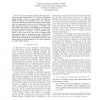Free Online Productivity Tools
i2Speak
i2Symbol
i2OCR
iTex2Img
iWeb2Print
iWeb2Shot
i2Type
iPdf2Split
iPdf2Merge
i2Bopomofo
i2Arabic
i2Style
i2Image
i2PDF
iLatex2Rtf
Sci2ools
ICNP
2007
IEEE
2007
IEEE
ALARM: Anonymous Location-Aided Routing in Suspicious MANETs
— In many traditional mobile network scenarios, nodes establish communication on the basis of persistent public identities. However, in some hostile and suspicious MANET settings, node identities must not be exposed and node movements must be untraceable. Instead, nodes need to communicate on the basis of nothing more than their current locations. In this paper, we address some interesting issues arising in such MANETs by designing an anonymous routing framework (ALARM). It uses nodes’ current locations to construct a secure MANET map. Based on the current map, each node can decide which other nodes it wants to communicate with. ALARM takes advantage of some advanced cryptographic primitives to achieve node authentication, data integrity, anonymity and untraceability (tracking-resistance). It also offers resistance to certain insider attacks.
| Added | 03 Jun 2010 |
| Updated | 03 Jun 2010 |
| Type | Conference |
| Year | 2007 |
| Where | ICNP |
| Authors | Karim M. El Defrawy, Gene Tsudik |
Comments (0)

